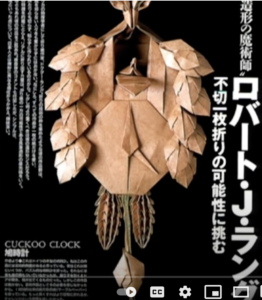Mathematics as the Central Principle of Modern Origami
At min 2:00 of his TED talk, Robert Lang asks what has allowed the recent explosion of innovation in the ancient art of origami:
And it raises a question: what changed? And what changed is something you might not have expected in an art, which is math. That is, people applied mathematical principles to the art, to discover the underlying laws. And that leads to a very powerful tool. The secret to productivity in so many fields -- and in origami -- is letting dead people do your work for you. (Laughter) Because what you can do is take your problem, and turn it into a problem that someone else has solved, and use their solutions. And I want to tell you how we did that in origami.
In his excellent talk, Lang refers to modern examples of origami, including a cuckoo clock made from one sheet of paper and no cuts. Lang proceeds to discuss the mathematics of origami. Beautiful, mathematical and mind-blowing. It's an excellent talk with more than a few laughs along the way.
cuts. Lang proceeds to discuss the mathematics of origami. Beautiful, mathematical and mind-blowing. It's an excellent talk with more than a few laughs along the way.
